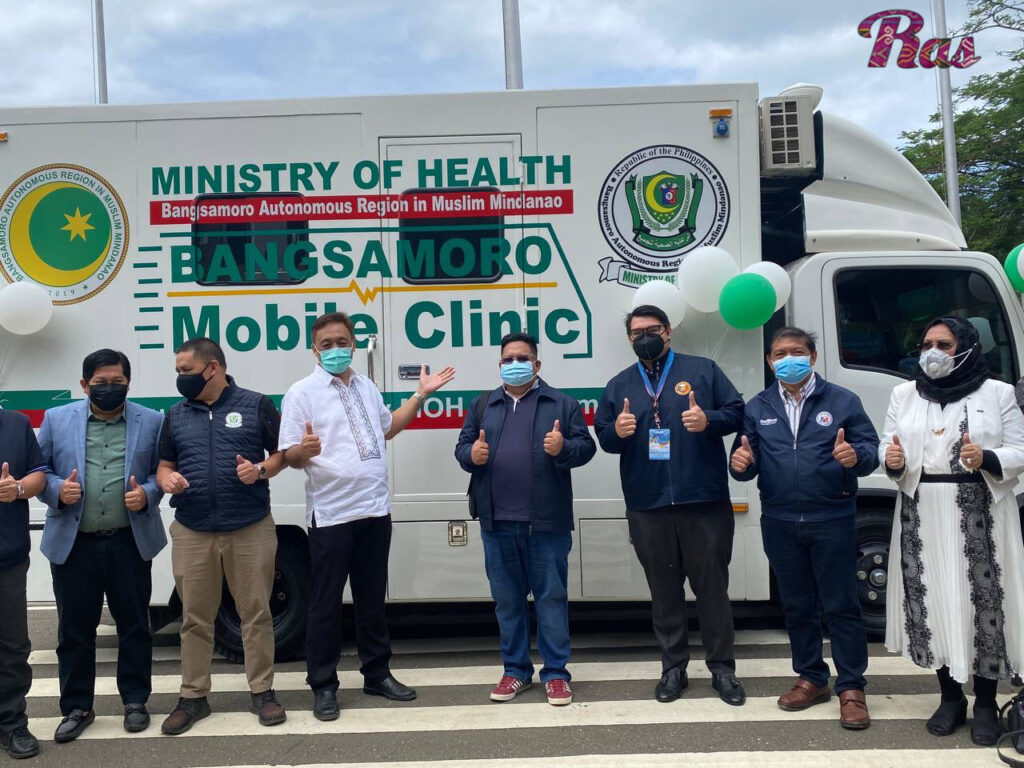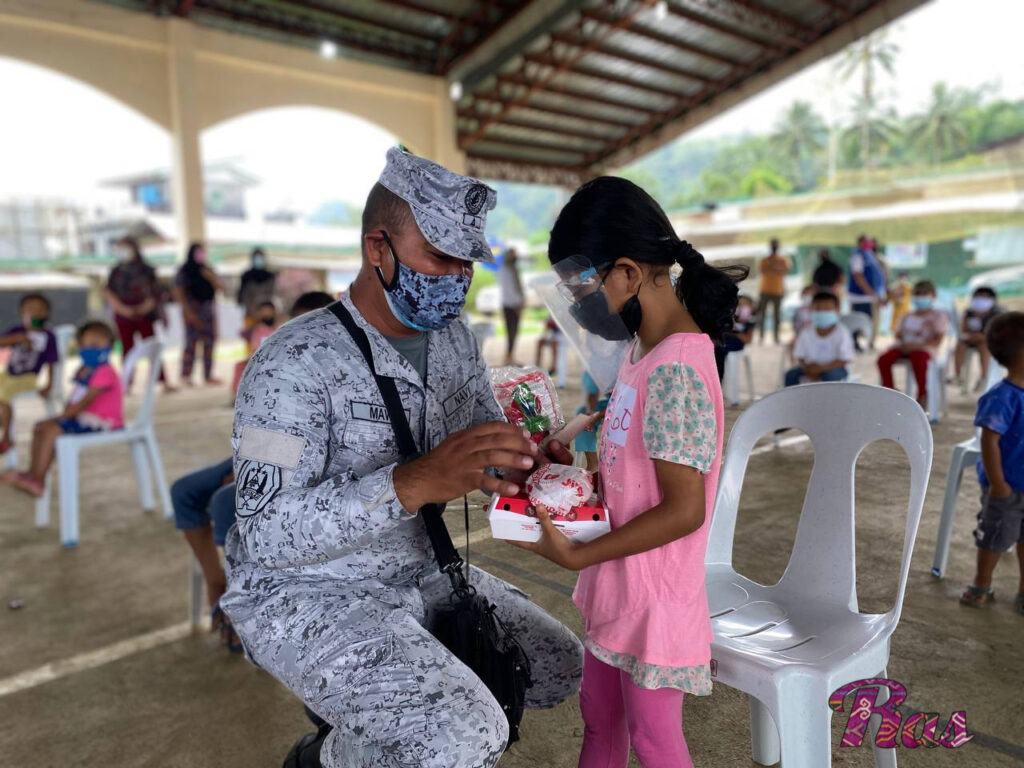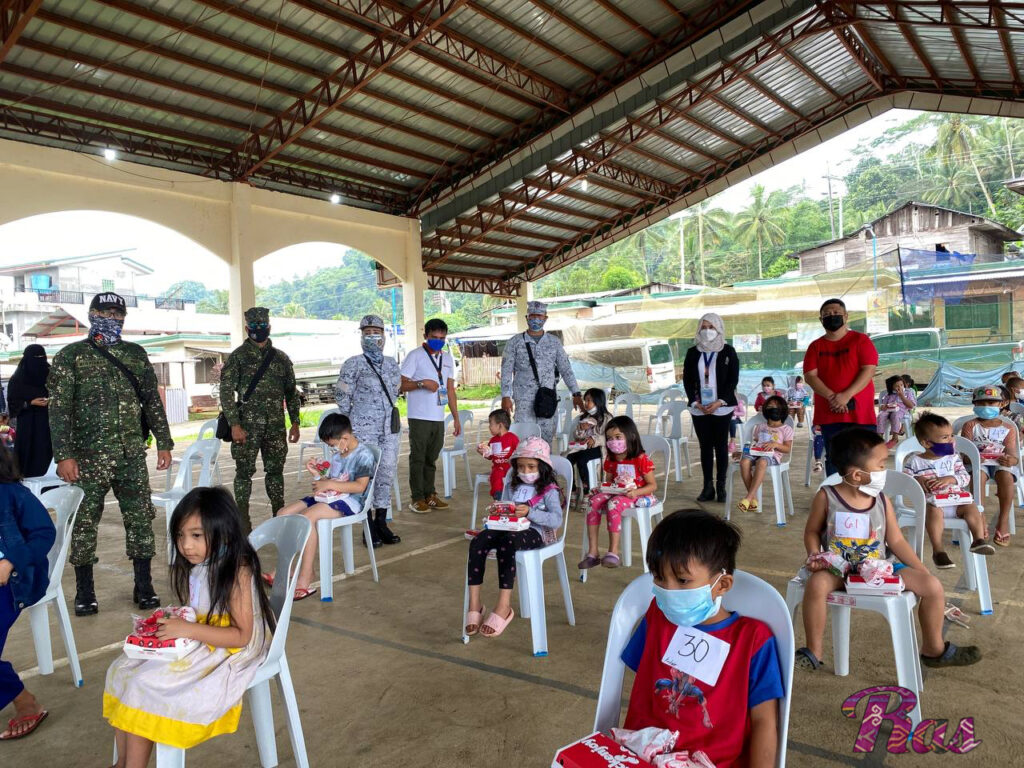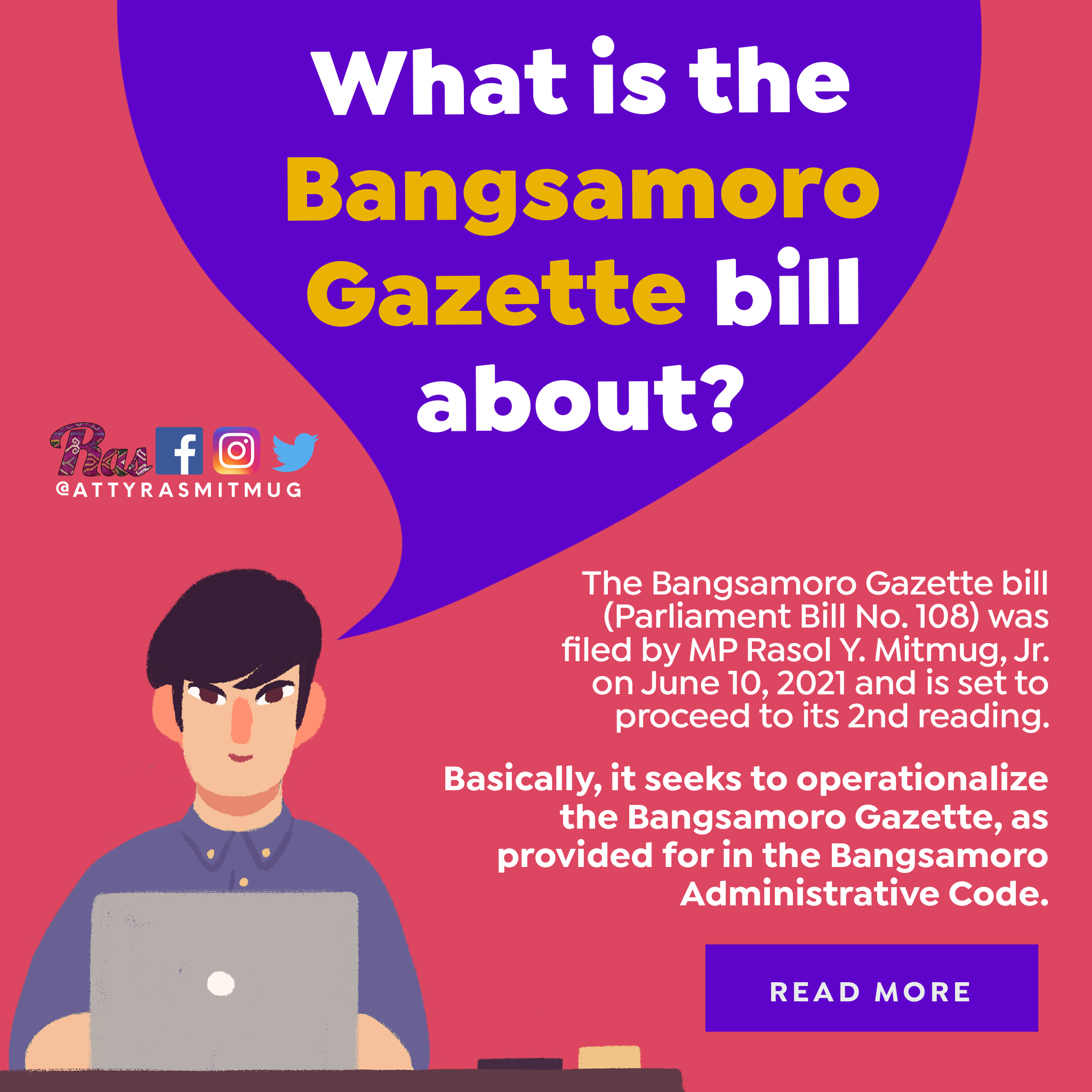
Parliament Bill No. 108, otherwise known as the Bangsamoro Gazette bill, was filed by MP Rasol Y. Mitmug, Jr. on June 10, 2021, and will proceed to its 2nd reading in the Bangsamoro Parliament at the 63rd plenary session.
But what does the Bangsamoro Gazette bill entail? It seeks to operationalize the Bangsamoro Gazette as provided for in the Bangsamoro Administrative Code.

Who will edit or supervise the Bangsamoro Gazette?
The Bangsamoro Information Office (BIO) will have supervision and editorial authority over the Bangsamoro Gazette.
What will be the content of the Bangsamoro Gazette?
The Bangsamoro Gazette will publish all legislative acts and resolutions, executive/ administrative issuances, Shari’ah Courts’ decisions or abstracts, and other public documents of general application.
Where can the public read the Bangsamoro Gazette?
Aside from its printed copies, the general public may access the Bangsamoro Gazette’s online version via its website.
When will it be published?
The BIO shall publish the Bangsamoro Gazette quarterly or as frequently as the public interest may require. Electronic publication on the website will be daily or as often as possible.
Why do we even need a Bangsamoro Gazette?
Section 12 and 14 of Chapter 3, Book I of the Bangsamoro Administrative Code (BAA 13) provides for the legal basis of the Bangsamoro Gazette.
Section 12. Effectivity of Executive Issuances. Executive issuanes shall take effect after fifteen (15) days following the completion of their publication in the Bangsamoro Gazette or in a newspaper of regional circulation, unless otherwise provided.
Section 14. Bangsamoro Gazette. The Bangsamoro Gazette shall be of the official gazette of the Bangsamoro Government which will publish all legislative acts and resolutions of a public nature, all executive and administrative issuances of general application, decisions or abstracts of decisions of the Shari’ah Courts of sufficient importance to be published, documents or classes of documents as may be required to be published by law and such documents or classes of documents of general application.
The Bangsamoro Gazette shall be published by the Bangsamoro Information Office (BIO) in the English language and whenever applicable, in Filipino and Arabic. It shall be made available to all national and local agencies upon subscription. The Bangsamoro Library and Archives shall servce as the official custodian and repository thereof.
Ministries and all offices and agencies shall submit copies of their issuances and similar documents to the Bangsamoro Information Office for publication.
Upon written request, the Bangsamoro Information Office shall translate the relevant documents in Arabic in coordination with the Bangsamoro Darul Ifta’.
In addition, Section 19, Chapter 3, Book I of the Bangsamoro Administrative Code specifies the need for publishing issuances before it is deemed effective.
Section 19. Government-wide Application of the Classification of Issuances. The Office of the Chief Minister shall provide such assistance as may be necessary to effect general adherence to the foregoing classification of issuances, including the conduct of studies for developing sub-classifications and guidelines to meet peculiar needs. All administrative issuances of a general or permanent character shall be compiled, indexed, and published pursuant to the provisions of this Code. Publication of administrative issuances affecting the public is required before the same shall become effective.
The Bangsamoro Attorney General’s Office shall be furnished with all the copies of the foregoing issuances and shall be repository of all these issuances. Likewise, copies shall be provided to the Bangsamoro Library and Archives.
How will the Bangsamoro Gazette benefit the people?
The Bangsamoro Gazette shall help fulfill the Bangsamoro people’s right to information and can lead to a more open, accountable, and participatory government.
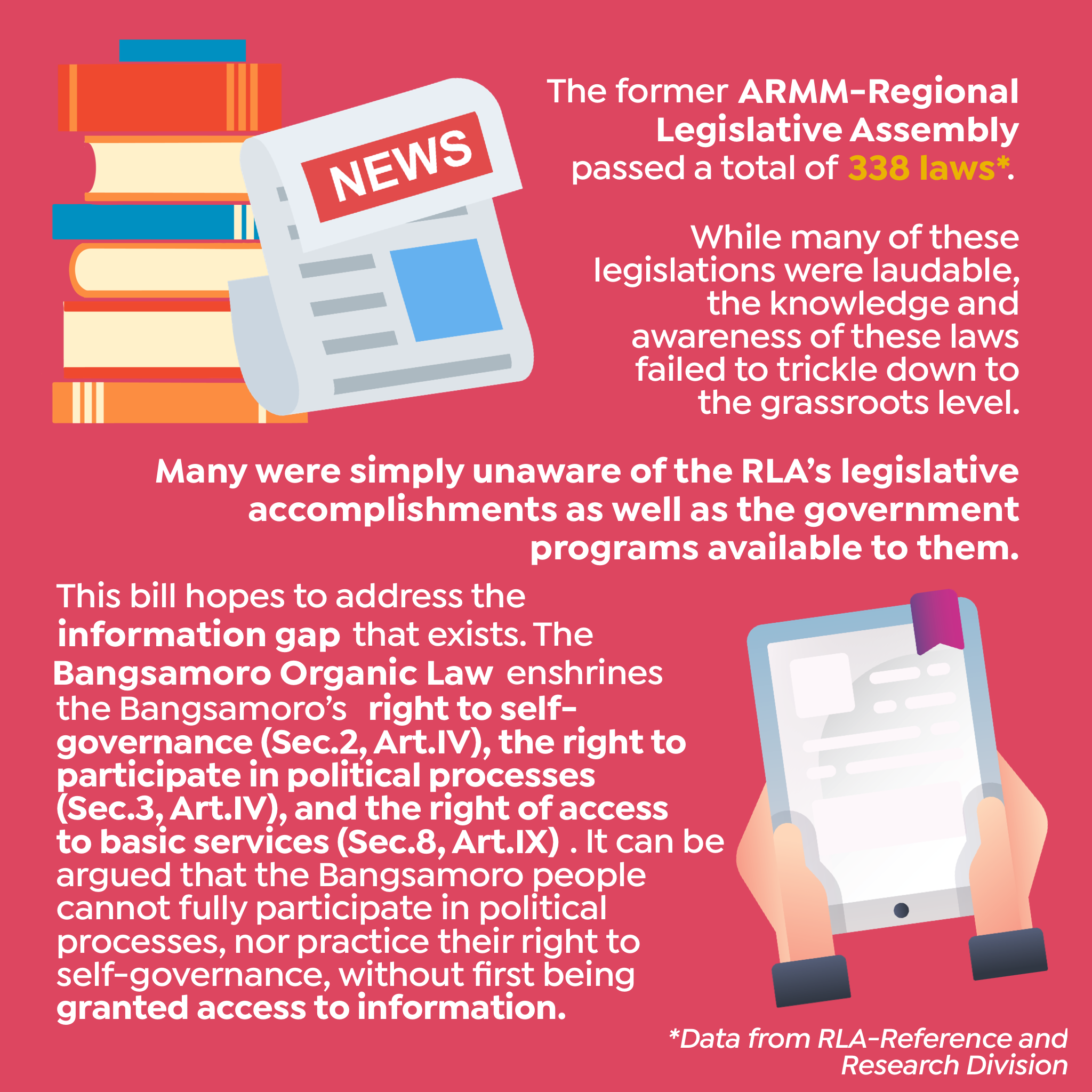
The former ARMM-Regional Legislative Assembly passed a total of 338 laws (data from RLA-Reference and Research Division).
While many of these legislations were laudable, the knowledge and awareness of these laws failed to trickle down to the grassroots level. (Note: Muslim Mindanao Autonomy Acts are still operational unless amended by the Bangsamoro Transition Authority).
Many were simply unaware of the RLA’s legislative accomplishments as well as the government programs available to them.
This bill hopes to address the information gap that exists. The Bangsamoro Organic Law enshrines the Bangsamoro’s right to self-governance, the right to participate in political processes, and the right of access to basic services.
Section 2. Self-Governance. In the exercise of its right to self-governance, the Bangsamoro Autonomous Region is free to pursue its political, economic, social, and cultural development as provided for in this Organic Law. (Article IV)
Section 3. Democratic Political System. The Bangsamoro Autonomous Region shall have a democratic political system that allows its people to freely participate in the political processes within its territorial jurisdiction. The Bangsamoro Autonomous Region shall have a parliamentary form of government. (Article IV)
Section 8. Right of Access to Basic Services. The Bangsamoro Government shall provide, maintain, and ensure the delivery of basic and responsive health programs, quality education, appropriate services, livelihood opportunities, affordable and progressive housing projects, power and electricity, and water supply, among others, to the Bangsamoro people and other inhabitants of the Bangsamoro Autonomous Region. It shall maintain appropriate disaster-preparedness units for immediate and effective relief services to victims of natural and man-made calamities. It shall also ensure the rehabilitation of calamity-affected areas and victims of calamities. (Article IX)
It can be argued that the Bangsamoro people cannot fully participate in political processes, nor practice their right to self-governance, without first being granted access to information.

This bill is also in line with the12-point agenda of the Bangsamoro Government, and the policy direction of the Government of the Day:
4. Continuity of Existing Government Services
Set up and implement programs and projects that will respond to the pressing social and economic challenges in the Bangsamoro such as poverty, education, health, access to clean water and electricity, job opportunity, agricultural productivity, and access to the capital market. These must be complemented with responsive strategic infrastructure in the region such as ports, road networks, flood control, and logistics and communication facilities.
7. Development of Enabling Policy Environment
Develop policy environment on transparency, accountability, prudent fiscal policy, as well as improvement in revenue generation.
Chief Minister Ahod Ebrahim’s State of the Bangsamoro Address at the opening of the 3rd regular session also highlighted the need to pass laws complementing the Bangsamoro Administrative Code.
“We must also look into the existing structures in our bureaucracy as founded by the recently passed Bangsamoro Administrative Code. It would be worthwhile to pass legislations not to amend certain provisions of the Admin Code but legislations that would enhance or complement few of its noble provisions.”
This post will be revised as updates come in.
Read the bill below:
[pdf-embedder url=’https://rasmitmug.com/resources/Bill108-MP-Rasol-Mitmug-BANGSAMORO-GAZETTE.PDF’]







